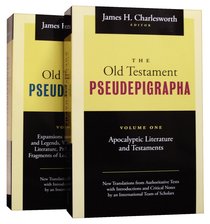The “Testaments of the Twelve Patriarchs” is dated by Charlesworth to around the time of the Septuagint (250 B.C.). Although deemed to contain second century Christian interpolations, it nevertheless contains some fascinating themes on the topic of kingdom and resurrection.
It finds some parallel in Qumran eschatological Messianism, where there are dual Messiahs, one the anointed king (Judah), and the other a priest (Levi).
It purports itself to be the final words of the sons of Jacob. Here are a few excerpts from Judah 24 and 25.
And after this there shall arise for you a Star from Jacob in peace: And a man shall arise from my posterity like the Sun of righteousness, walking with sons of men in gentleness and righteousness, and in him will be found no sin. And the heavens will be opened upon him to pour out the spirit as a blessing of the Holy Father. And he will pour the spirit of grace on you. And you shall be sons in truth, and you will walk in his first and final decrees. This is the Shoot of God Most High; this is the fountain for the life of all humanity. Then he will illumine the scepter of my kingdom, and from your root will arise the Shoot, and through it will arise the rod of righteousness for the nations, to judge and save all that call on the Lord.
And after this Abraham, Isaac and Jacob will be resurrected to life and I and my brothers will be chiefs (wielding) our scepter in Israel...
And you shall be one people of the Lord, with one language.
There shall no more be Beliar's spirit of error, because he will be thrown into eternal fire.
And those who died in sorrow shall be raised in joy; and those who died in poverty for the Lord's sake shall be made rich; those who died on account of the Lord shall be wakened to life.
And the deer of Jacob shall run with gladness;
the eagles of Jacob shall fly with joy;
the impious shall mourn and sinners shall weep,
but all peoples shall glorify the Lord forever.
James H. Charlesworth, The Old Testament Pseudepigrapha: Volume One, Apocalyptic Literature and Testaments, trans. H.C. Kee (Peabody, Mass.: Henderickson Publishers, 2013), 1:801-802.


No comments:
Post a Comment